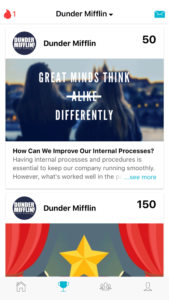The holy grail of great leadership is simply getting the most positive productivity for an extended period from your team. That. Is. It.
If I take your current team and I get them to do more work that is of the same or higher quality, I am a better leader than you are. “Yeah, well, they don’t like you as much as they like me!”
I wasn’t hired to be friends. That’s a different game that I can also win if you want to play!
Productivity is the ultimate measure. It leads to better business outcomes. Highly productive employees stay at their jobs longer and have higher rates of job satisfaction. While that end measure of productivity is a great measuring stick, actually getting increased productivity in a positive way is super hard!
I’ve found three ways to get increased productivity where both the leader and the employee feel good about the outcomes:
- Deliver career value to the employee.
An employee that truly believes you have their best career interest at heart will run through walls for you, but they really have to believe you are helping their career. That means you have to be very transparent about how this increase in productivity will lead to what they want, not what you want and the organization wants.
Also, if you lie about this and don’t deliver, you’ll lose this employee forever. You need to put in the time and work to put yourself in the position to start acting like their career mentor, it just doesn’t happen overnight. Be clear of the path and process you’ll be taking them on.
- Acknowledge individual productivity increases in a public way, especially to the senior most leaders of the organization.
Appreciation is paramount in getting and extending productivity increases in your employees. One way I love to support the leaders in the organization is to manage-up to those leaders by giving them information on specific individuals that I want to have them give appreciation to.
I will send the leader a message that states specifically the person, their email address or phone number, and what they did that was above and beyond. Then, I go one more step! I will tell the leader specifically what I expect them to do with this information!
It sounds like a bit of micro-managing but in reverse. What I’ve found is leaders are busy and they love that I give them all the information and what specifically I expect them to do with that information. They know that the employee will love getting the appreciation, and they love giving the appreciation, and in how I’ve delivered this to them makes it super easy for the leader to execute!
- Define, specifically what ‘extra’ is and what the employee will get in return.
Too often, I find, employees believe they are going above and beyond when the leader only sees them doing the job they were hired to do. Great performance management is about defining what is expected in the role, and specifically what it takes to thrive in the role.
Once you do this as a leader, getting more is just a function of seeing which employees want to reach that next step and rewarding that effort. No yelling. No kicking and screaming. Just acknowledgment of great work done by employees who want to be successful in their chosen job.
To learn more about Increasing Productivity in your Workforce check out the great resources at Trakstar!





